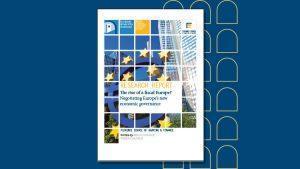Links
Next content
Read more
The Rise of a Fiscal Europe? Negotiating Europe’s New Economic Governance
The Eurozone crisis brought the question of public finance oversight sharply into focus. In February 2010, as the global financial crisis morphed into a deep crisis of the single currency, the attendant problems were...
The European Banking Union’s institutional structure, democratic legitimacy and future outlook were discussed at a conference organised by the European Uni¬versity Institute on the 22 May 2015. The conference brought together lawyers, economists and political scientists as well as EU practitioners to discuss the nature of the processes that gave rise to the banking union. Its aim was to retrace the de-cision-making process leading to the Banking Union and to address the trade-off between efficient problem solving, on the one hand, and democratic legitimation on the other. Given the emergence of new conflict lines among and within Eu¬ropean Member States (creditors/debtors; pro-centralization/anti-centralization; banks/tax-payers), another central intellectual concern was to understand how the adopted institutional arrangements reflected these frictions, and how they are likely to influence the functioning of the Banking Union in the future.
The Banking Union represents a substantial set of new competencies for the Eu¬ropean Union. Building on the diversity of participants’ disciplinary backgrounds, the conference hence discussed some of the legal and political issues this delega¬tion of competencies raises. One was the extent to which the Banking Union looks similar or different to the way EU competences in competition policy have devel-oped and more generally to the regulation of the single market. There were broad concerns about the accountability of the current institutional arrangements, and indeed a lively debate about what the demands of democratic legitimacy entail and how accountability mechanisms could be designed in the case of the Banking Union. Whether the future of the Banking Union involves continued muddling through, or whether it will eventually require a strong fiscal capacity and thus treaty change, was a lively topic of discussion.
